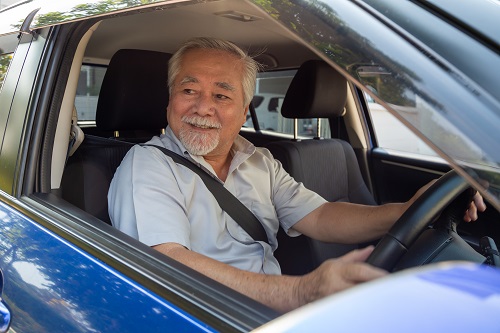Driving and Parkinson’s

Exercising in different climates
5th April 2021
COTA hosts Navigating Home Care Packages Zoom
5th April 2021Driving and Parkinson’s

Driving and Parkinson’s
Surrendering your driver’s license is like surrendering your independence – but unfortunately that time must come at some point in your Parkinson’s journey.
It is important to remember that Parkinson’s can affect your ability to self-evaluate. Therefore, it is a good starting point to discuss your driving with your caregivers and your doctor. They may have a different perception of your driving skills.
In the early stages of Parkinson’s, you have the option to modify your driving habits to address the physical and cognitive changes you are experiencing. For example, you can adapt by driving shorter distances and avoiding peak hour traffic and night- time driving. Or if you drive a manual car, it may be sensible to convert to an automatic instead.
However, as your condition progresses, issues may develop which could result in impaired driving performance.
Insurance Regulations
It is recommended that you inform your insurance company of your Parkinson’s diagnosis – however it is not mandatory. In some cases, failure to disclose this information may result in your insurance being cancelled.
Driving, Parkinson’s and Medications
Just as sight-impaired people must wear their glasses when driving, people living with Parkinson’s must take their medication as prescribed when driving.
It is not always possible to predict, but some medications can affect driving ability. Reactions to medications vary between individuals and you may not realise that a medication is affecting your driving.
Therefore, when starting to take a new medication, check with your doctor and pharmacist that it is safe to drive.
Transport for NSW Requirements
NSW law requires the holder of a driver license to notify, as soon as practicable, Transport for NSW of any long-term injury or illness that may impair their ability to drive safely.
Transport for NSW must be satisfied that all license holders are medically fit to drive. A license holder can be directed to have regular medical examinations because of a medical condition.
When you report your illness, it does not necessarily mean that your license will be taken away. It does mean that Transport for NSW can work with you and your doctor to manage your condition with respect to your driving.
Will your doctor notify Transport for NSW?
As the relationship between you and your doctor is a confidential one, your doctor will not normally communicate directly with Transport for NSW.
He or she will provide you with advice about your ability to drive safely, as well as a letter or report to take to Services NSW that handle licensing transactions for Transport for NSW. Doctors also have an obligation to public safety so your doctor may notify Transport for NSW directly if he or she feels your condition poses a significant threat to public safety.
Medical Examinations
If you are required to have a medical examination, Transport for NSW will send you a letter with a medical report form about eight weeks prior to the date it is due.
Specialised Driver Assessment and Retraining Service
Drivers living with Parkinson’s may require a driving assessment by a suitably qualified occupational therapist before a license will be issued or reissued.
Concerned about the driving of a relative or friend?
If you know a license holder whose health might be affecting his/her ability to drive safely, it is important to get them to talk to their doctor.
If they are unwilling to discuss this with a doctor, you should contact Transport for NSW who will deal with the matter confidentially.
For many people giving up their right to drive can be a serious and upsetting step. Make sure that their driving skills really are unsafe.
For more information contact Parkinson’s NSW 1800 644 189.



